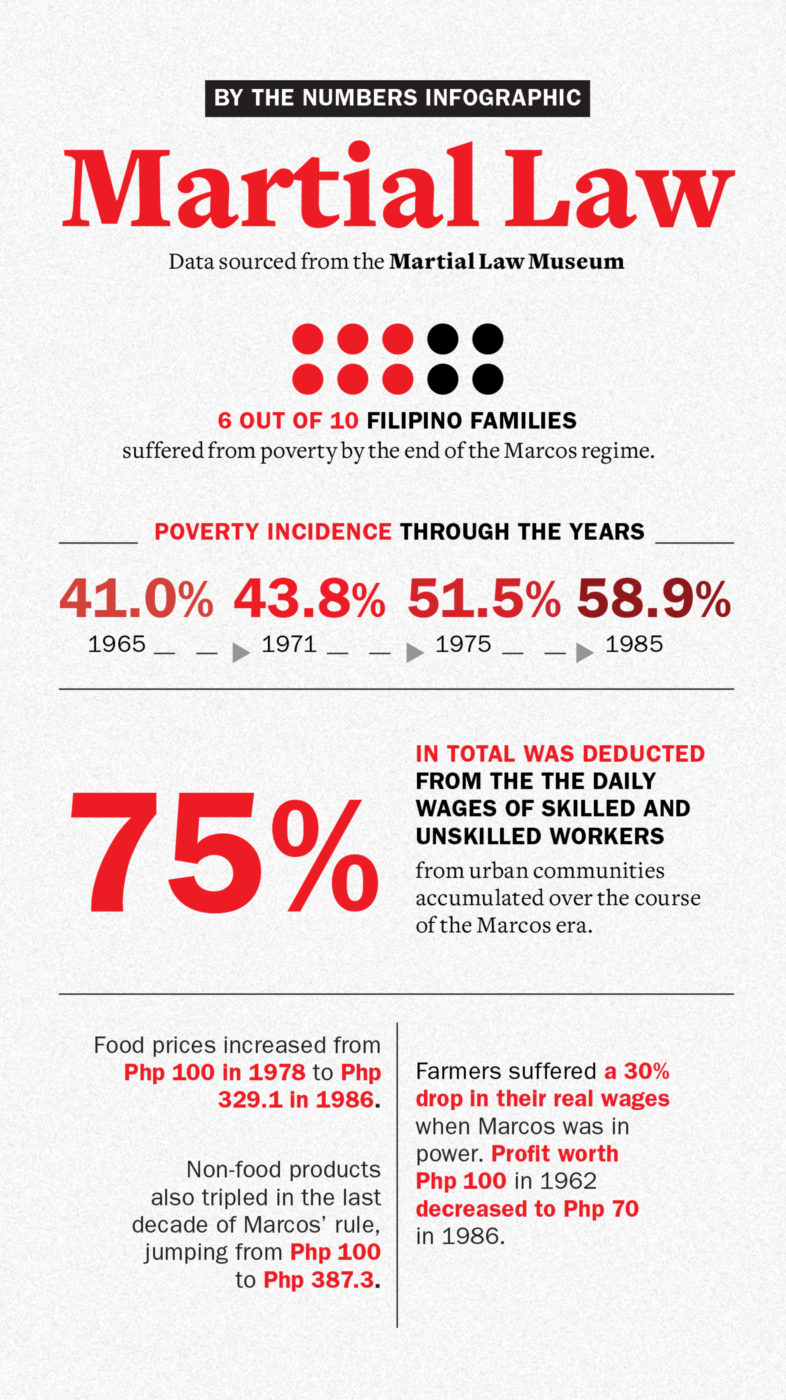IT HAS been nearly half a century since the day former dictator Ferdinand Marcos Sr. seized every television and radio set across the country to declare the national imposition of Martial Law. September 21, 1972 will forever be etched onto the minds of Filipinos as the day that marked an era of extreme censorship, corruption, and human rights abuses. Barred from a variety of media and free thought, Filipinos were treated as prisoners in their own country.
On November 8, 2016, the Supreme Court approved the Duterte administration’s motion to bury Ferdinand Marcos Sr. at the Libingan ng Mga Bayani despite opposition from some government members and civilians who strongly condemned the proposal. Ten days after the executive ruling to grant the former dictator a hero’s burial, the Marcos family stole away under the public eye and rushed a covert funeral. To this day, Marcos remains buried alongside recognized Filipino heroes and martyrs of freedom. The Supreme Court’s decision and the Marcos family’s continued success in recent national elections has made it apparent that the atrocities of Martial Law are in danger of not only being forgotten, but outright rewritten.
The politics of memory
The country has witnessed the aggressive resurgence of the Marcoses into the public consciousness in the past four years. In addition to their successful bid for Ferdinand Marcos’ “heroic burial” in 2016, the Marcos family clinched seats of power in the Senate and Congress, following the most recent national elections. Senator Imee Marcos notably urged critics of her family’s re-involvement in politics to “move on” from the atrocities committed during her late father’s dictatorship.
Aside from the Marcoses recent campaigns to bring their family into relevance, English Department professor Jocelyn Martin, PhD, mentions former edifices of the Marcos family that continue to stand and twist history in their favor. The so-called “Malacañang of the North” was the former residence of the Marcos family that was converted into a presidential museum. “That’s where you see their narrative of their presidency. Everything there was successful. Nothing about Martial Law was mentioned [in the museum],” she explains. According to Martin, allowing these institutions to stand helps shape national history and how it is taught in favor of the Marcoses. “We might think that memory is random, but it can be made. It can be fabricated, institutionalized. It can be canonized,” she warns.
The recent success of the Marcos family in haunting the country’s affairs continue to be exacerbated by social media pages that have shared false statistics and reports that glorify the Philippines under the Marcos regime. These manipulations and distortions of history, commonly referred to as “historical revisionism,” serve to further propagate the falsehoods that supporters of the Marcos family are reported to rely upon.
The online Martial Law Museum (MLM), a digital information hub on the history, data, and figures related to Martial Law, was recently established to combat these historical distortions. Political Science professor and MLM administrator Arjan Aguirre explains the museum’s three goals: “Mag-aral (To study) means to make available the materials about ML and educate the people. Magturo (To teach) means that education has to be proactive. Materials must be turned into modules for the teachers. Manindigan (To take a stand) stands for a call to action.”
Furthermore, Aguirre explains that the MLM seeks to be as objective as possible by moving past the narrow “Aquino vs. Marcos” framework of understanding by narrating Martial Law history from multiple viewpoints. “It’s a collective story… it shouldn’t be just one generation [or] political group dominating,” he says. Aguirre also mentions the danger of having one generation’s story being imposed on another generation’s perspective of Martial Law. “Is this the story of one group or for the nation?”
As for the youth, their indignation towards the attempts to revise the Martial Law narrative and the Duterte administration’s assent to the Marcos’ re-emergence in national politics has been displayed through mass demonstrations along national avenues and even on basketball courts. The current generation does not only fight to remember history, but also to prevent the facts from succumbing to revisionism as well.
Sown seeds
The University’s student organizations serve as the lifeblood for student activism, keeping the fervent battle against historical revisionism alive within the campus. Between mobilizations in response to media censorship and collective stances in support of civil rights, many student groups within the Ateneo actively resist oppression in all its forms.
Matanglawin, a campus publication founded during the time of Martial Law, is one such organization that acknowledges the importance of their rebellious roots. The organization was initially established as a “mosquito press,” a term used to describe small publications that dauntlessly criticized the Martial Law government amidst harsh media censorship and journalistic suppression.
Matanglawin AY 2019-2020 Editor-in-Chief Caila Noche shares that the era of Martial Law played a pivotal role in the publication’s history as it helped in “shaping [Matanglawin’s] branding and journalistic aims.” In line with this mission, the publication continues to release special issues about the human rights violations that Filipinos suffered under Marcos’ dictatorship. One such issue is titled “Bawal Makalimot,” which retells the stories of Ateneans who were tortured and killed during Martial Law.
Noche explains that the purpose of publishing these issues is to “keep the memory of these events alive [and] to be sure they don’t slip back into history or become misconstrued.”
Another youth group that attempts to quash the ongoing trend of Martial Law revisionism is Panday Sining Katipunan, an unaccredited student organization in Ateneo that asserts its use of art and literature to “promote a culture of active social involvement” within the campus. Panday Sining Secretary General Elise Ofilada stresses that the voice of the Ateneo student community is integral in sparking constructive criticism and positive social change. “Many of us attempt to bring back or revive the spirit of militancy ng mga kabataan noong panahon ni Marcos… I think it’s the best way we remember the time of Martial Law. Yes, it was a time when grave yung human rights abuso, grabe yung estado, but it was also the peak of resistance from the Filipino people,” Ofilada says.
[Many of us attempt to bring back or revive the youth’s spirit of militancy seen at the time of Marcos… I think it’s the best way we remember the time of Martial Law. Yes, it was a time when the abuse of human rights were grave and when the state was cruel, but it was also the peak of resistance from the Filipino people]Among other things, Panday Sining Katipunan has been critical of the University and its supposed ties with the Marcoses. Ofilada emphasizes the need for accountability on the administration’s part, especially with regard to the underlying inconsistencies of their stances. She explains that although the University administration claims to support anti-revisionist Martial Law initiatives such as the ‘Never Again’ and ‘No to Martial Law’ movements, they also “get immediate Marcos members into its campus as though it’s no big deal.”
Warnings in the echoes
The irony of the University’s stance against Martial Law recently manifested itself in an egregious incident within the campus grounds. Last April 4, 2019, Irene Marcos-Araneta attended the opening of the Areté’s Amphitheater. The daughter of Ferdinand Marcos Sr. was invited on behalf of Yael Buencamino, the Areté’s former Executive Director. The incident only became public in the succeeding days, when pictures of Marcos-Araneta posing outside Areté made rounds on social media.
Uproar within Ateneo soon followed, as the Sanggunian released a statement condemning the incident. The student government called Marcos-Araneta’s presence a “vehement mockery to Martial Law survivors and martyrs.”A separate statement by various members of the Ateneo community also petitioned for a formal apology from the University. On April 14, University President Jose Ramon T. Villarin, SJ released a statement expressing regret for what had transpired and announcing the voluntary resignation of Buencamino.
While Villarin’s statement might have signaled the end of this controversy, public attention towards the invitation may have also brought to light that the Areté’s Amphitheater is named after Ignacio B. Gimenez. Ignacio B. Gimenez is the wife of Fe Roa Gimenez, the former Malacañang Social Secretary during Marcos’ administration. In January 2016, the Gimenez family was officially recognized by the Sandiganbayan to have acquired a part of the Marcoses’ ill-gotten wealth.
Ateneo’s ties with the Marcoses should not be tolerated and can be considered quite embarrassing, especially since the recent incidents are not the first of their kind. Back in 2014, former First Lady Imelda Marcos was invited as a guest of honor to the 40th anniversary of the Ateneo Scholarship Fund (ASF). Villarin also issued an apology for this event, stating, “I would like to assure you that we in the administration have learned our lesson to be more mindful of those we invite to our celebrations.” Unfortunately, it seems like the administration has not learned from their mistakes.
The administration’s previous interactions with the Marcoses contradicts its own advocacy to combat historical revisionism. The school’s condemnation of Martial Law’s atrocities will prove hypocritical if it continues to affiliate with the very individuals it speaks out against.
Torches from bonfires
While the University may have failed to uphold the integrity of its stances against Martial Law and its perpetrators, it still possesses an institutional platform and responsibility to continue opposing the historical revision of Martial Law where political statements may dilute and administrative judgements may falter, the Ateneo’s students, faculty, and alumni community must continue to do its part in defending the truth.
On the 47th anniversary of Martial Law, we must commemorate the heroes who fought for our liberty by standing against tyrants who urge us to look away from the lessons of our history. Protests, critical literature, and performance art are only some of the many ways we can demonstrate our struggle against the suppression of our national memory. For as long as we fight to remember the truths of our past, we move a step closer towards understanding how history might never have to repeat itself again.








